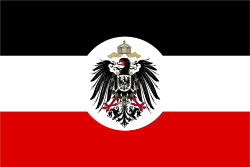Imperial Colonial Office

The Imperial Colonial Office (German: Reichskolonialamt) was the German governmental agency tasked with managing Germany's overseas protectorates or colonies. After the First World War, on 20 February 1919, the Imperial Colonial Ministry replaced the Imperial Colonial Office. It dealt with settlements and closing-out of affairs of the occupied and lost colonies.
Development and reorganization
From its inception in 1884, a colonial service organization performed administrative functions (policy and management) for the executive arm of the imperial government. Until 1907 responsibility for this service was with the Colonial Department Kolonialabteilung as a subsection in the Foreign Office Auswärtiges Amt. From 1896 the department further co-supervised the colonial military or protection force, the "Schutztruppe", with its headquarters billeted in the naval ministry, the Reichsmarineamt. By the late 19th century the need evolved for a separate, higher ranking agency that would report directly to the Reich Chancellor. In early 1907 the Reichstag removed the colonial department from the foreign office and elevated the department to an Amt office, the Reichskolonialamt, to be managed by a cabinet level secretary. The new office was then physically relocated to Berlin’s Wilhelmstrasse. This legislation represented a complete reorganization and was a direct response to the nationwide so-called "Hottentot election", after allegations of colonial malfeasance, corruption and brutality (e.g., German South West Africa) surfaced in the German print media. The shake-up subsequently involved extensive and wide-ranging personnel changes in civil service positions in the colonies. The Schutztruppe command structure was also reorganized and moved to Mauerstrasse, in close proximity of the Reichskolonialamt location.
The new secretary of the Reichskolonialamt reported directly to the head of government, the chancellor.
Reichskolonialamt secretaries
- Bernhard Dernburg (1865 – 1937), in office May 1907 – 9 June 1910
- Friedrich von Lindequist (1862 – 1945), in office 10 June 1910 – 3 November 1911
- Wilhelm Solf (1862 – 1936), in office 20 December 1911 – 13 December 1918
- Johannes Bell (1868 – 1949), Colonial Political Envoy at the Paris Peace Conference from 13 February 1919 to 20 June 1919
Structure
The new Reichskolonialamt had three departments Abteilungen:
- Department A dealt with general political, policy and administrative functions
- Department B managed fiscal, transport and technical tasks
- Department C was concerned with personnel matters
- The subordinated Kolonialhauptkasse main cashiers bureau dealt with disbursements, payrolls and other financial transactions
- The headquarters command of the Schutztruppe was often seen as the quasi fourth department, with colonial governors nominally the superiors of troop commanders in the field
The Kolonialrat colonial advisory board was replaced in 1908 (after the major reorganizations of 1907) by a panel of independent experts. A Landeskundliche Kommission scientific and geographic commission for exploration functioned for several years before its mission was modified and replaced in 1911 by the Ständige Wirtschaftliche Kommission permanent economic commission. Further commissions were formed by the German Agriculture Council and tasked with advising the colonial office.
The records of the Reichskolonialamt and other documents from the colonies are now preserved at the branch location at Berlin-Lichterfelde of the German Federal Archives and were previously held at the Deutsches Zentralarchiv, Potsdam, an agency of the former East German regime.
References
Zeller, Joachim & von der Heyden, Ulrich. Kolonialmetropole Berlin - eine Spurensuche Colonial Metropolis Berlin - a Search for Traces. Berlin. 2002.
External links
- "Kolonialabteilung, Reichskolonialamt und Reichskolonialministerium 1890-1920" von Arne Schöfert
- Wilhelmstr. 62: Das Reichkolonialamt (Afrika in Berlin - Stadtspaziergang des DHM)
- Reichskolonialamt im Koloniallexikon
| ||||||||||||||||||||||